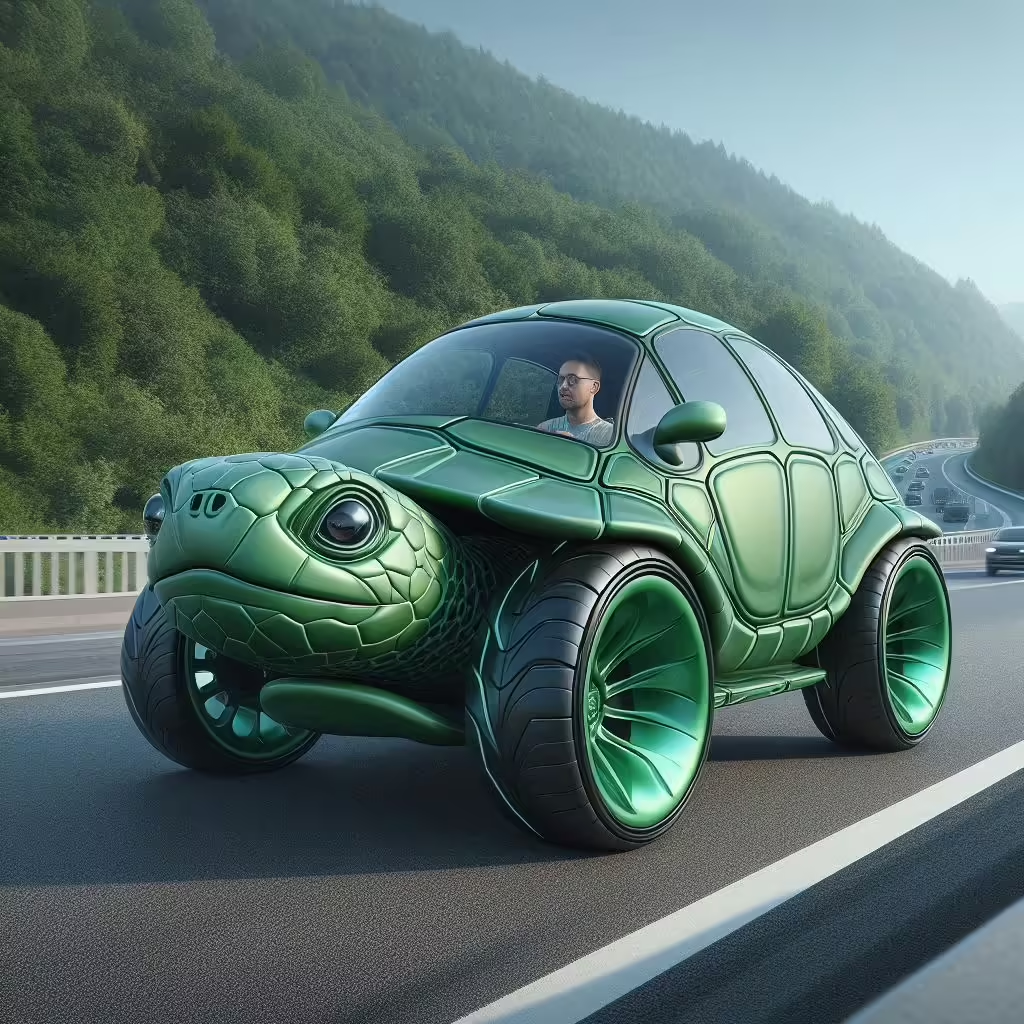In the realm of automotive innovation, creativity knows no bounds. Designers and engineers are constantly reimagining vehicles, from sleek sports cars to futuristic electric vehicles. However, one trend that has captured the hearts of nature enthusiasts and eco-conscious drivers alike is the turtle-shaped car. This quirky, adorable vehicle combines function and fun, all while providing an eco-friendly appeal. Let’s dive into what makes turtle-shaped cars stand out and explore their unique features and benefits.
What Is a Turtle-Shaped Car?
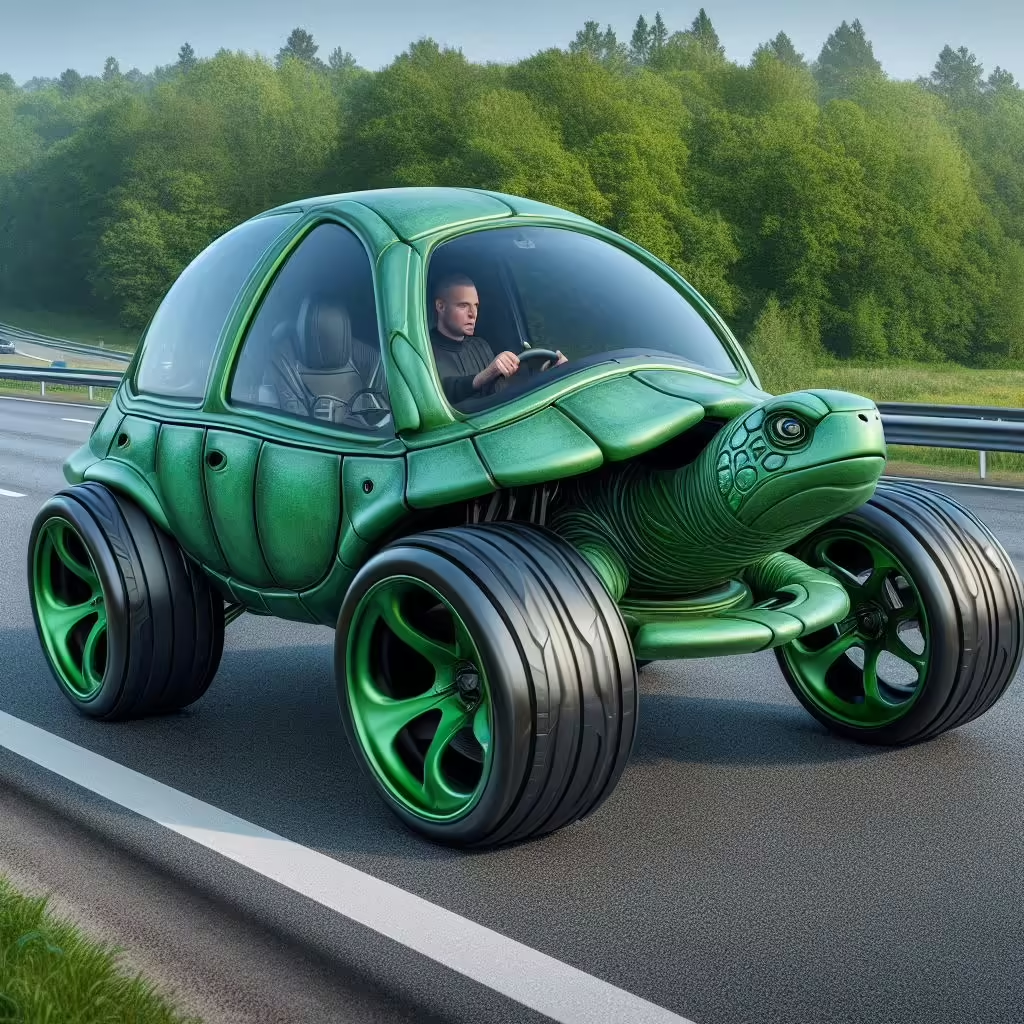
A turtle-shaped car, as the name suggests, is a vehicle designed to resemble a turtle, typically with a rounded, compact body and green or earthy colors. These cars are crafted to mimic the gentle, curvaceous design of a turtle’s shell, and some even include textures or paintwork that resemble the natural patterns found on turtles.
Why Are Turtle-Shaped Cars So Popular?
The allure of turtle-shaped cars goes beyond aesthetics. They are seen as an eco-friendly and imaginative alternative to conventional car designs. Embracing the turtle – an emblem of patience, nature, and longevity – these cars appeal to drivers who value sustainability and uniqueness.
- Eco-Friendly Design: Many turtle-shaped cars incorporate sustainable materials and electric power, making them a great choice for environmentally conscious consumers.
- Attention-Grabbing Aesthetics: Turtle-shaped cars have a distinct look that makes them stand out on the road, appealing to people who want a vehicle that reflects their personality.
- Compact and Convenient: These cars are often small and efficient, perfect for urban driving and easy parking in crowded areas.
Key Features of Turtle-Shaped Cars
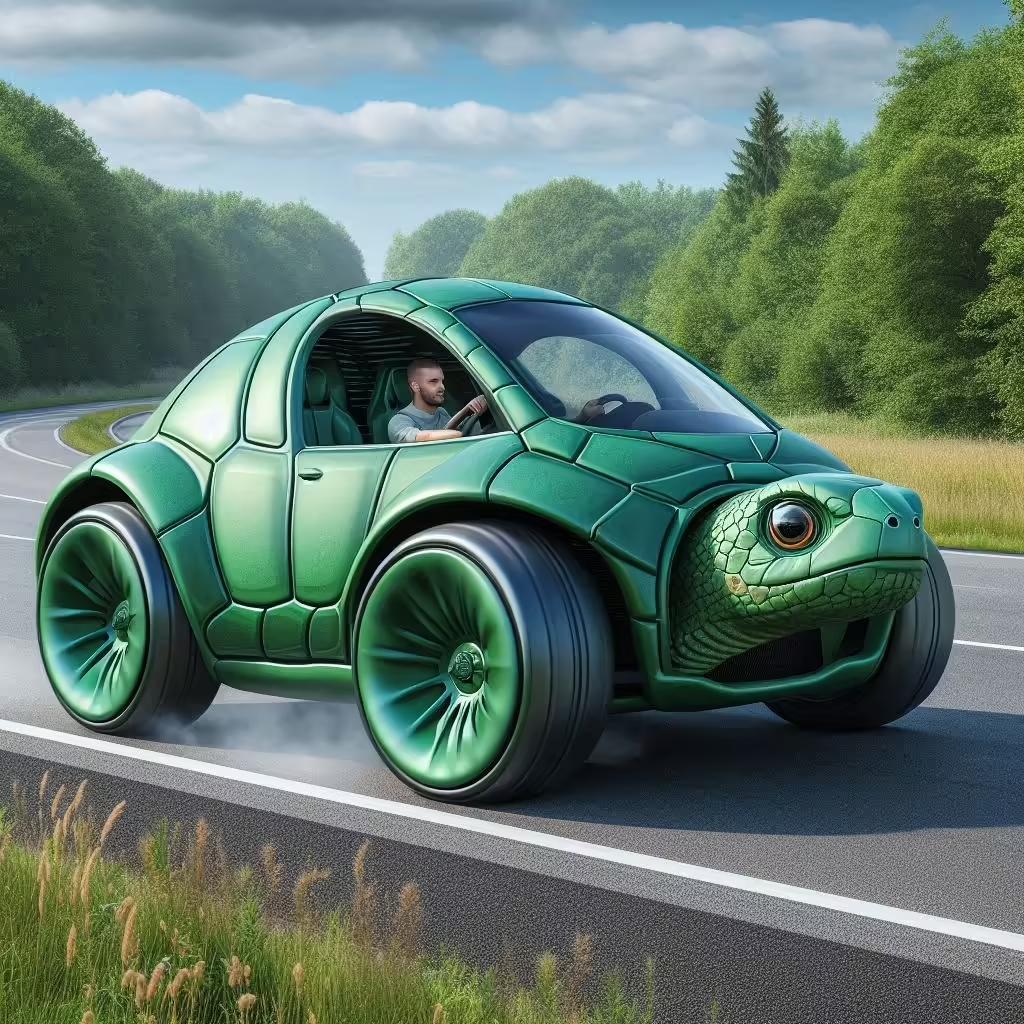
Nature-Inspired Exterior
The turtle-shaped car’s most distinguishing feature is its exterior, which takes cues from a turtle’s natural appearance. Some models feature a rounded roof and shell-like patterns, while others might sport subtle nods to the turtle’s shape, such as a streamlined, curvaceous body.
Eco-Friendly Power Options
In keeping with the theme of environmental consciousness, many turtle-shaped cars are powered by electric or hybrid engines. This shift not only reduces emissions but also aligns with the vehicle’s symbolic connection to nature. As the world embraces green technology, turtle-shaped cars represent an ideal combination of innovative design and sustainability.
Compact Size for Urban Driving
Turtle-shaped cars are generally small, making them ideal for city driving and parking. Their compact size is a significant advantage in urban areas where space is often limited. Despite their small footprint, many models maximize interior space efficiently.
Benefits of Owning a Turtle-Shaped Car
Owning a turtle-shaped car isn’t just about having a vehicle that looks adorable – it comes with practical benefits as well. Here’s why more people are choosing these cars:
Eco-Friendly and Sustainable
With their nature-inspired design, turtle-shaped cars often promote a greener lifestyle. Many models are built with recycled or sustainable materials, and electric or hybrid versions align with the values of eco-conscious drivers.
Fuel Efficiency and Reduced Costs
Turtle-shaped cars, especially electric or hybrid versions, can offer significant savings on fuel costs. Since many models are compact, they require less energy to operate and can even have lower maintenance costs, making them an economically wise choice.
Unique Design That Sparks Joy
The charm of a turtle-shaped car is undeniable. Whether it’s the humorous design or the nod to wildlife, these vehicles bring a sense of joy and lightheartedness to driving. They also provide a unique way to make a statement about your personality and values.
Popular Turtle-Shaped Car Models
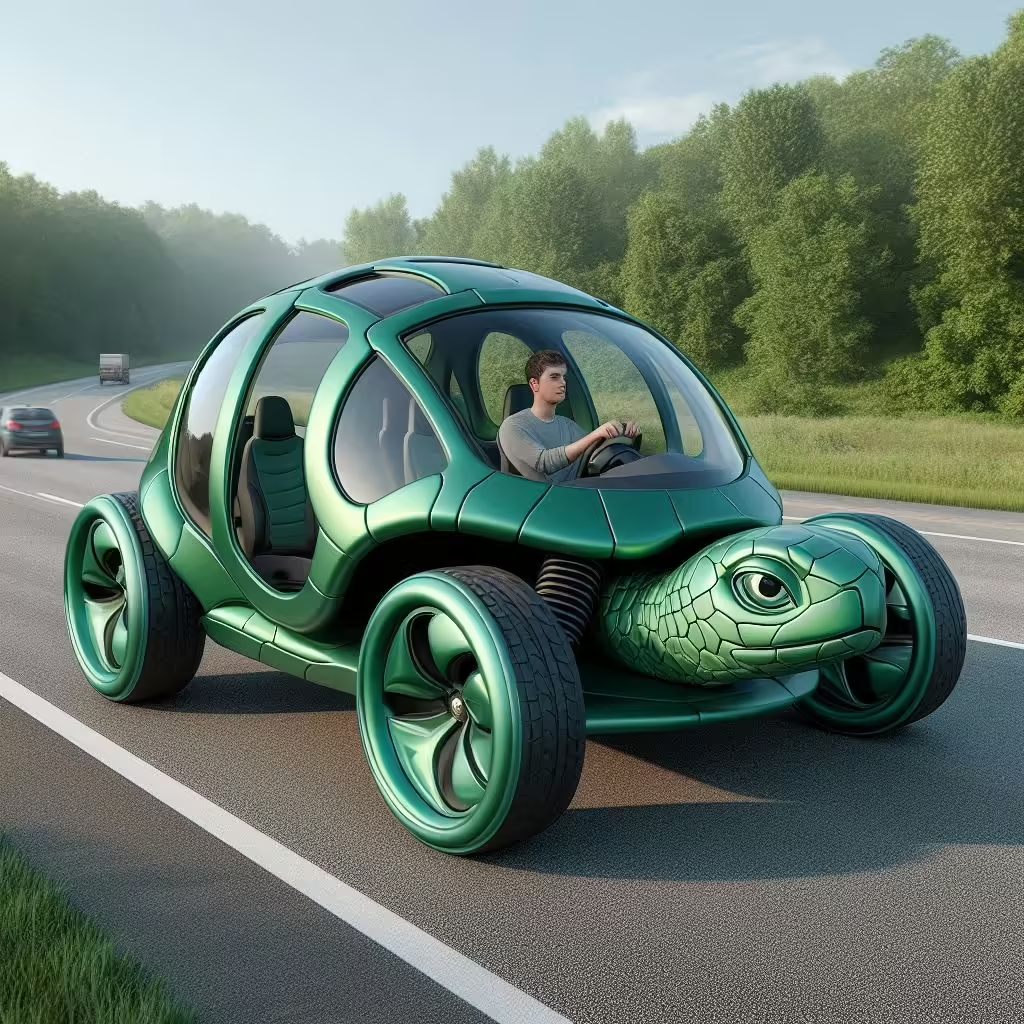
While turtle-shaped cars are not yet mainstream, a few innovative designs have made their mark in recent years. Let’s explore some notable models that embody the turtle-inspired trend.
The Volkswagen Beetle Concept Car
Volkswagen introduced a concept car based on its classic Beetle that has been redesigned to resemble a turtle. With rounded edges, green paintwork, and eco-friendly technology, this model is a fun reinterpretation of a beloved classic.
Japanese Kei Car Adaptations
In Japan, kei cars are small, uniquely designed vehicles that are ideal for city life. Some manufacturers have experimented with turtle-inspired adaptations of kei cars, incorporating green color schemes and round, shell-like designs. These cars are especially popular among younger drivers who love quirky aesthetics.
Custom Turtle Car Models by Independent Designers
Car enthusiasts and independent designers have crafted one-of-a-kind turtle-shaped cars using modified vehicle bodies and unique paint jobs. These custom models are often seen at car shows and attract attention due to their whimsical, nature-inspired look.
Turtle-Shaped Cars and the Environment
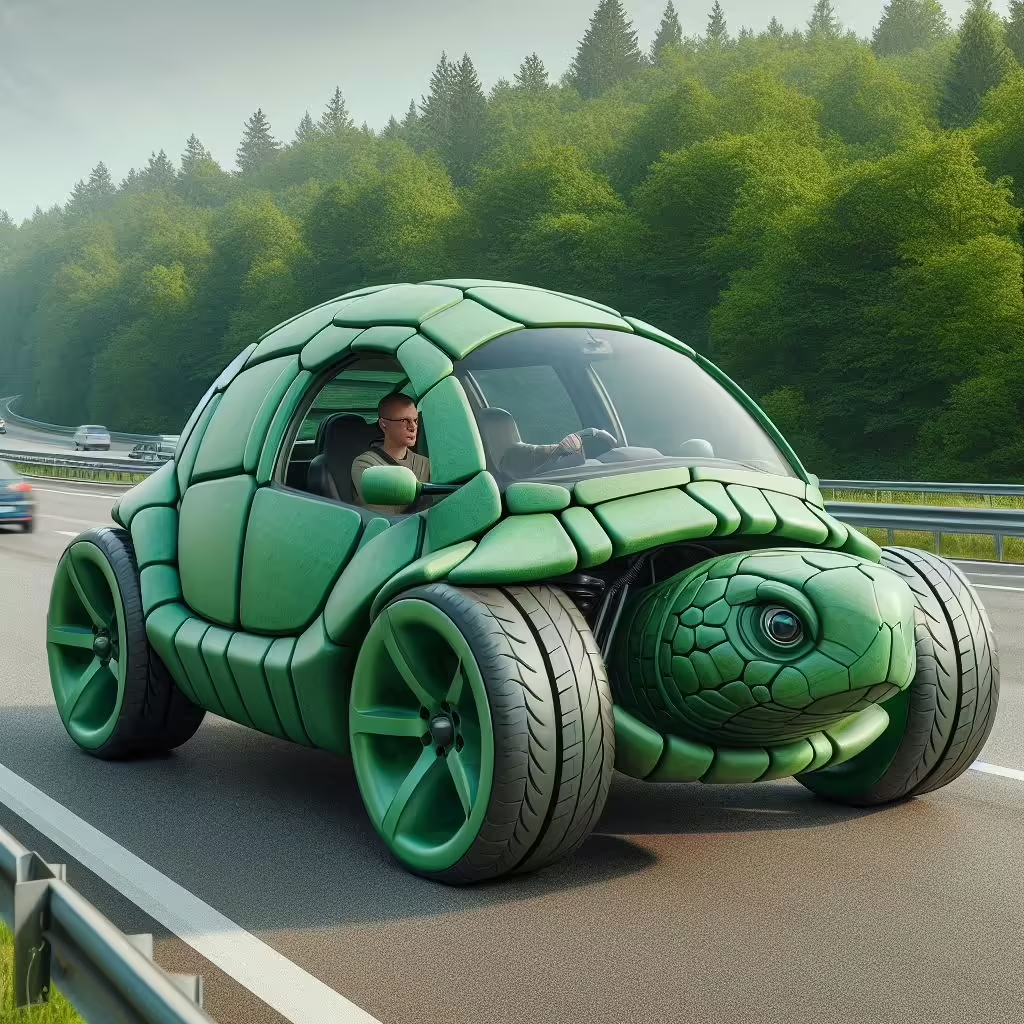
A Symbol of Eco-Friendly Innovation
The turtle is a symbol of nature and sustainability. Turtle-shaped cars emphasize the importance of respecting the environment while using sustainable resources. For instance, carmakers are increasingly turning to recycled materials, bio-friendly paints, and energy-efficient manufacturing processes in the production of turtle-shaped cars.
Electric Turtle-Shaped Cars: A Step Toward Carbon Neutrality
Electric vehicles (EVs) have become a significant part of the movement towards reducing greenhouse gas emissions, and turtle-shaped cars with electric engines further this cause. By pairing a nature-inspired design with zero-emission technology, these cars are a testament to how automotive design can promote environmental awareness.
Reducing Environmental Impact Through Compact Design
Smaller cars generally have a lower environmental impact than larger ones, as they require fewer materials to produce and less fuel or energy to operate. Turtle-shaped cars, often being compact and lightweight, contribute to this effort by offering a design that’s not only adorable but also conscientious.
Turtle-Shaped Cars as a Lifestyle Statement
The Appeal of Driving a Nature-Inspired Car
Choosing a turtle-shaped car goes beyond function – it’s also about making a statement. For many owners, driving a car that resembles a turtle is a playful way to express their love for nature, wildlife, and sustainability.
Perfect for Families and Young Drivers
The charm of a turtle-shaped car is often appreciated by families with children and younger drivers who enjoy quirky, non-traditional vehicles. These cars can bring a smile to passersby and encourage conversations about conservation and creativity.
Showcasing Individuality on the Road
A turtle-shaped car is far from ordinary, and that’s exactly what makes it appealing. For those who prefer to avoid the conventional and stand out on the road, a turtle-shaped car serves as the perfect vehicle to showcase individuality and creativity.
Turtle-Shaped Cars in Popular Culture
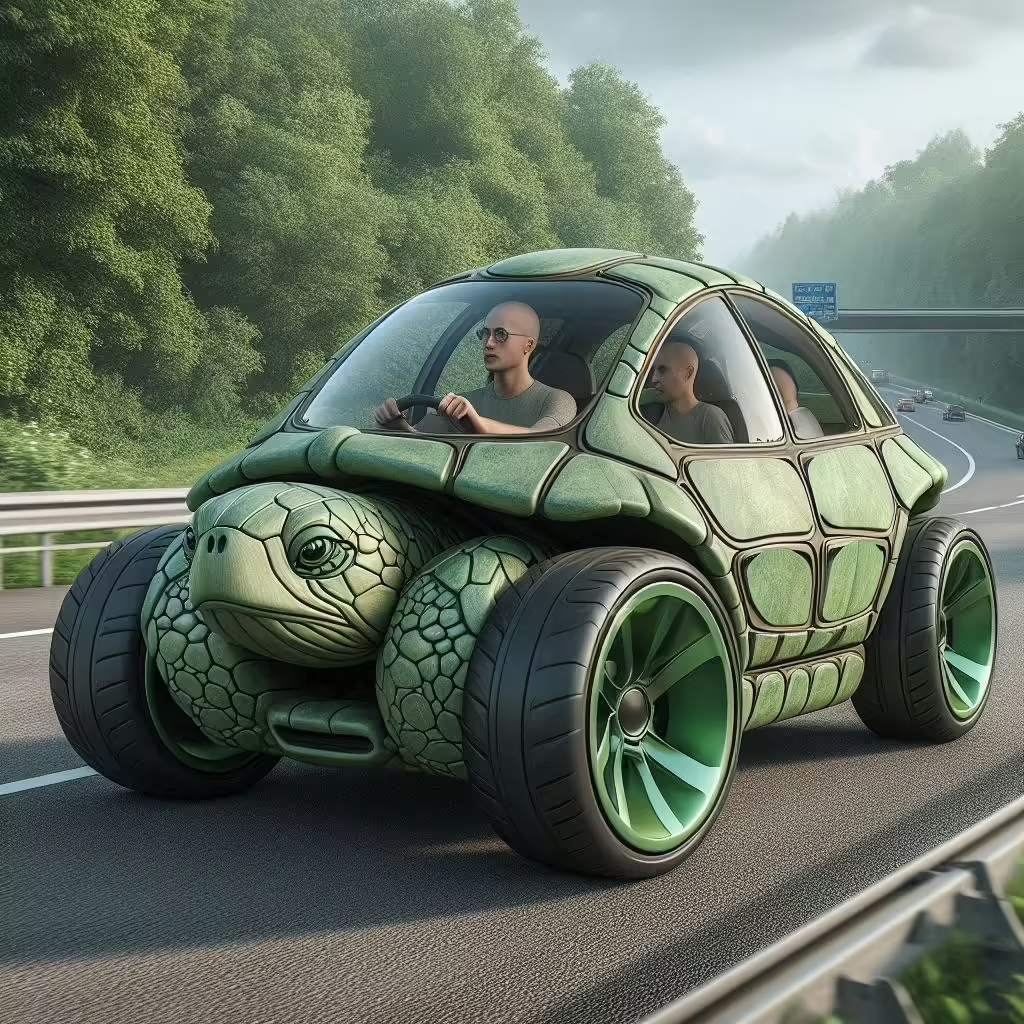
The popularity of turtle-shaped cars has also spilled over into popular culture. These cars are often featured in media, video games, and even cartoons, where they’re depicted as friendly, approachable vehicles that children and adults alike can enjoy.
Challenges of Turtle-Shaped Car Ownership
While turtle-shaped cars have plenty of appeal, they come with unique challenges as well.
Limited Availability
As a niche product, turtle-shaped cars may not be as widely available as standard models. This limitation can make it difficult for enthusiasts to find turtle-shaped cars, especially outside major cities.
Cost of Customization
Since many turtle-shaped cars are custom-built or modified from existing models, they can be more expensive than standard cars. For buyers interested in a custom turtle-shaped car, costs for modifications and custom paint jobs can add up.
Are Turtle-Shaped Cars Here to Stay?
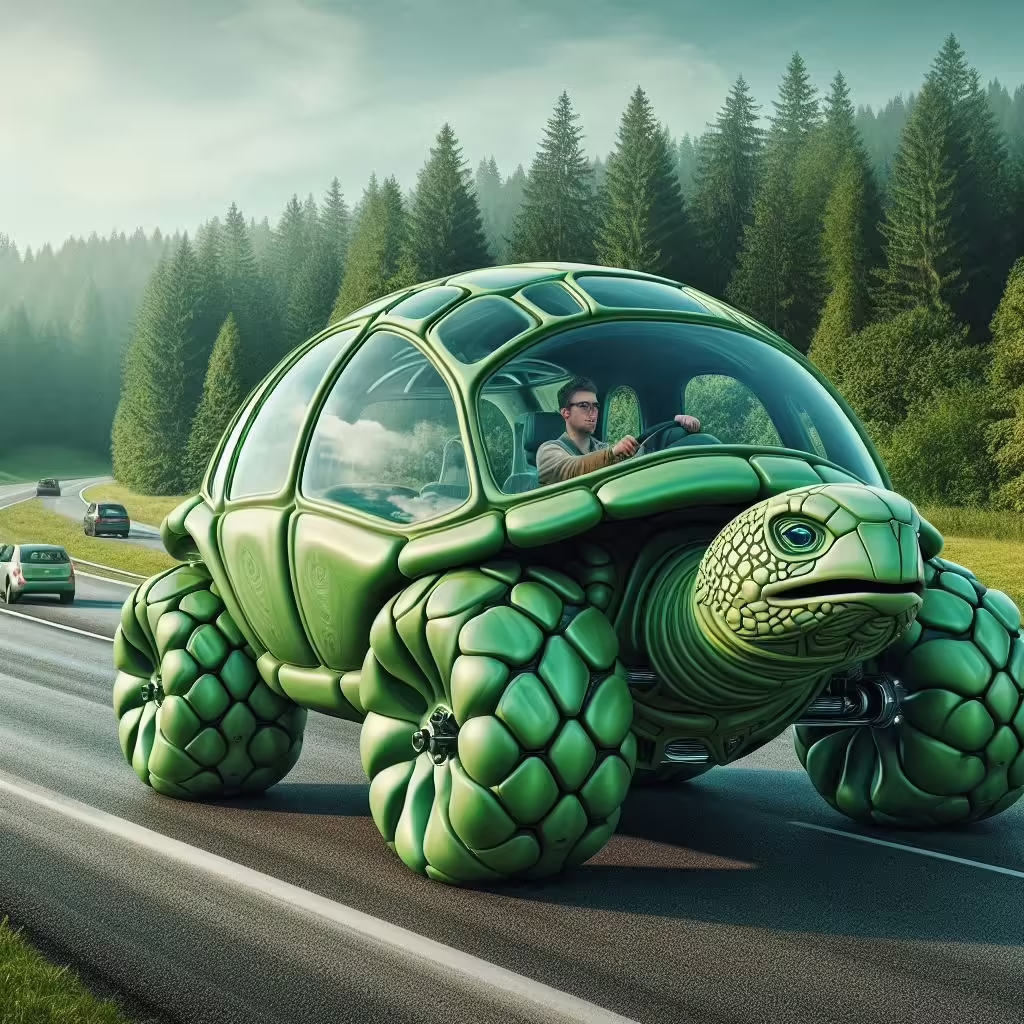
As more consumers prioritize sustainability and creativity, turtle-shaped cars could potentially grow in popularity. Their eco-friendly appeal, unique design, and compact size make them a compelling choice for city dwellers and nature enthusiasts alike. With advancements in technology, we may see more automakers developing concept cars that incorporate nature-inspired themes, bringing turtle-shaped cars closer to the mainstream market.
The Future of Turtle-Shaped Cars: Trends and Innovations
As the automotive industry continues to evolve with a focus on sustainability, turtle-shaped cars are likely to experience exciting advancements. These innovations aim to enhance their functionality, align with eco-conscious lifestyles, and make them a viable option for more drivers.
Advanced Electric Battery Technology
Battery technology is improving at an incredible rate, and turtle-shaped cars are set to benefit. Modern batteries are smaller, lighter, and have extended ranges, which makes compact cars like these perfect for sustainable, longer-distance travel. Advanced battery technology could allow turtle-shaped electric cars to drive for hundreds of miles on a single charge, extending their use beyond urban commutes.
Fast-Charging Capabilities
One challenge for electric vehicles (EVs) is charging time. However, new developments in fast-charging stations and rapid-charging batteries can address this issue, making turtle-shaped EVs as convenient as their gas-powered counterparts. This enhancement makes electric turtle-shaped cars more appealing to a broader audience, including those who prioritize convenience alongside sustainability.
Autonomous Driving Features
Autonomous driving is an emerging trend in the automotive world, and turtle-shaped cars may embrace this technology to enhance their urban-friendly appeal. Imagine a turtle-shaped car with self-driving features: it could be perfect for city dwellers who want to get around without the hassle of driving themselves. For fans of nature, this allows more time to relax and enjoy the ride while reducing stress on crowded city streets.
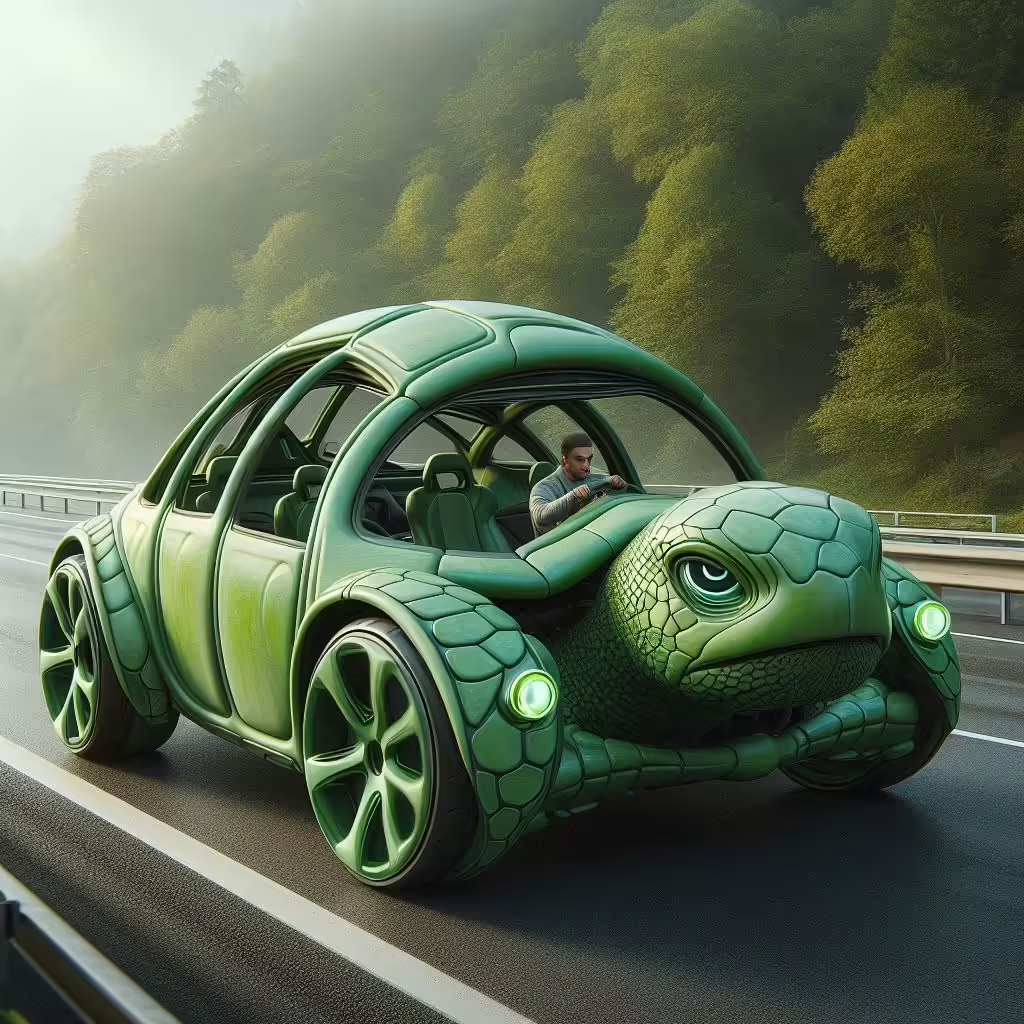
Smart City Integration
Turtle-shaped cars equipped with autonomous and smart technologies could integrate well into future “smart cities.” They can interact with city infrastructure to optimize routes, avoid congested areas, and lower travel times. As cities become greener and more intelligent, turtle-shaped cars with these capabilities could become key players in urban mobility solutions.
Sustainable Manufacturing Processes
To make turtle-shaped cars even more eco-friendly, manufacturers are turning to sustainable production methods. This includes using recycled materials, minimizing waste, and investing in renewable energy sources for manufacturing plants. These practices reduce the overall environmental impact of producing turtle-shaped cars, reinforcing their status as a sustainable option.
Biodegradable Components
Some manufacturers are even experimenting with biodegradable components. Using materials that decompose over time, such as plant-based composites and eco-friendly paint, further enhances the car’s alignment with nature. Biodegradable interiors and exteriors are not only better for the environment but also contribute to reducing landfill waste once the car reaches the end of its life cycle.
Solar-Powered Turtle-Shaped Cars
An intriguing innovation on the horizon is the development of solar-powered turtle-shaped cars. These vehicles could have solar panels embedded in the car’s shell, harnessing sunlight to power certain systems. Although fully solar-powered cars are still in the research phase, incorporating solar technology into turtle-shaped cars could extend battery life and allow for auxiliary power, reducing the dependency on charging stations.
How Turtle-Shaped Cars Support Sustainable Urban Development
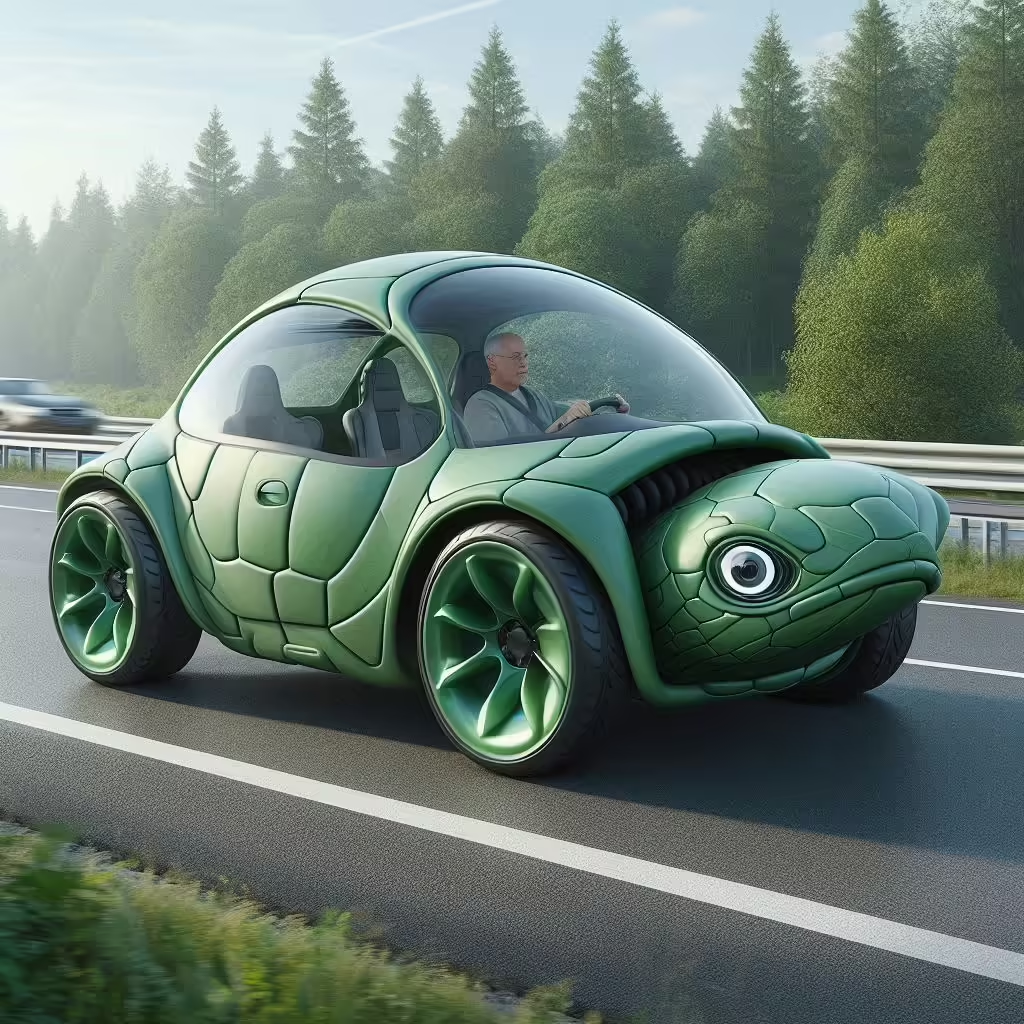
In an age when cities are striving to become more sustainable, turtle-shaped cars are an ideal fit. Their compact design, eco-friendly attributes, and urban functionality make them well-suited to the demands of modern urban planning.
Reducing Carbon Footprints in Cities
The compact nature and efficient energy use of turtle-shaped cars help reduce urban carbon footprints. In congested cities where emissions are a concern, these cars contribute less pollution, promoting cleaner air and a healthier environment for residents. When powered by electricity or solar energy, turtle-shaped cars become even more impactful by completely eliminating tailpipe emissions.
Encouraging a Shift from Large Vehicles
As people embrace more compact and efficient vehicles, turtle-shaped cars encourage a shift from large, fuel-intensive vehicles to smaller, more sustainable options. This change helps alleviate traffic congestion and reduces energy consumption. Urban planners are even considering incentives, such as special parking zones and reduced tolls, to encourage the use of compact, eco-friendly cars like turtle-shaped models.
Inspiring Eco-Friendly Lifestyles
Turtle-shaped cars are more than just vehicles; they inspire a broader eco-friendly lifestyle. By choosing a car that symbolizes environmental values, owners are often motivated to make more sustainable choices, such as reducing single-use plastic, recycling, and conserving energy. The symbolism of the turtle as a nature-friendly icon resonates well with consumers who strive to live harmoniously with the environment.
The Appeal of Turtle-Shaped Cars Among Different Age Groups
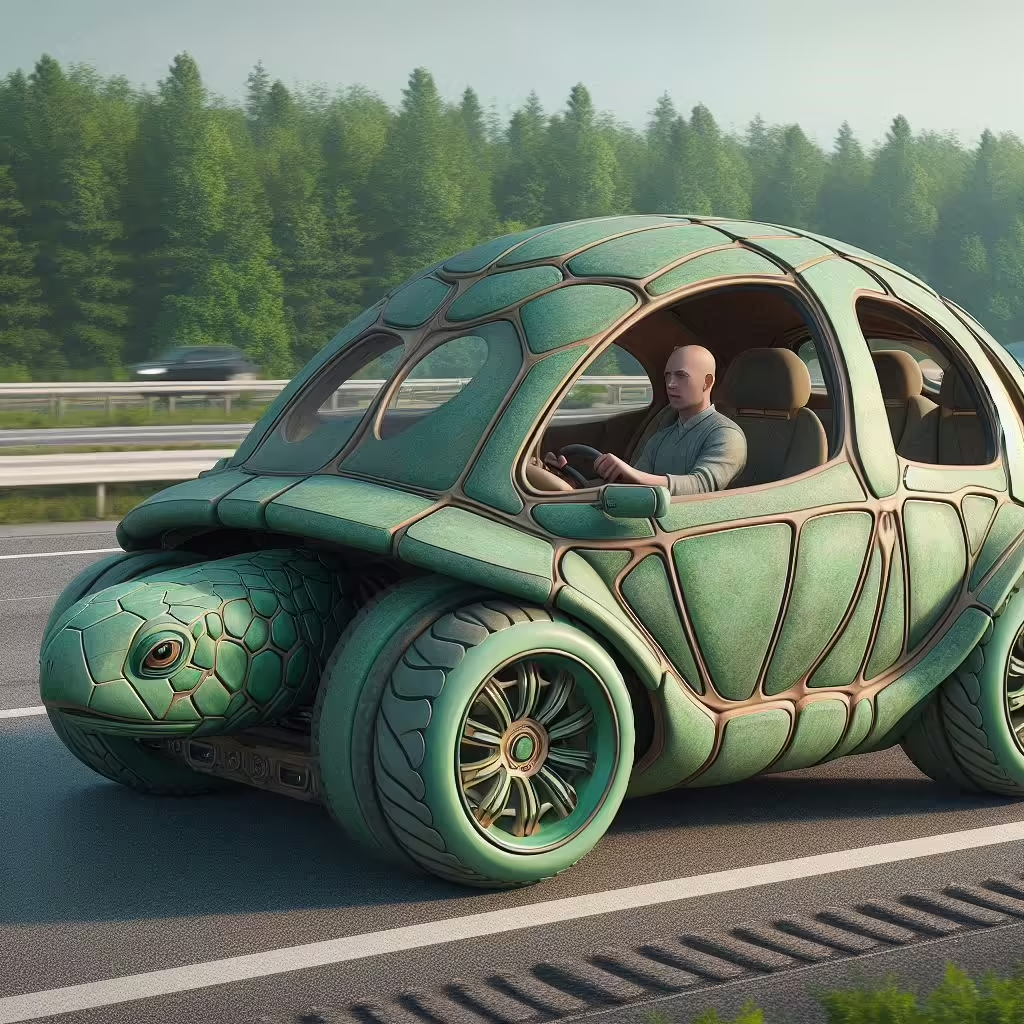
Turtle-shaped cars appeal to a wide range of people, from young adults and families to retirees, each drawn by unique aspects of the car’s design, functionality, and symbolism.
Young Drivers: Embracing Quirky and Eco-Friendly Vehicles
For young drivers, a turtle-shaped car offers an affordable, unique, and eco-friendly alternative to traditional cars. Its distinctive design aligns with the preferences of younger generations who value individuality and sustainability. The combination of a fun aesthetic and advanced technology, such as electric engines, makes turtle-shaped cars a hit among younger audiences.
Families: Compact and Practical
Families with small children also find turtle-shaped cars appealing, especially as a secondary or city vehicle. The small size, eco-friendliness, and low operating costs make turtle-shaped cars ideal for short trips around town. Parents appreciate the playful design, which can make car rides more enjoyable for kids and provide a memorable vehicle experience.
Eco-Conscious Retirees: A Symbol of Nature and Longevity
Retirees and eco-conscious adults often connect with the symbolism of the turtle as a creature of resilience and longevity. Turtle-shaped cars, especially electric or solar-powered models, align with the values of those who prioritize environmental responsibility and enjoy a slower, peaceful pace of life.
Turtle-Shaped Cars as a Symbol of the Future
The turtle-shaped car trend signifies more than a novelty – it’s a symbol of the shift towards sustainable, creative, and nature-inspired automotive design. As the world faces climate change and environmental challenges, turtle-shaped cars remind us that design can serve both function and inspiration. They allow us to express individuality while making conscious choices for the environment.
If you’re a driver who values uniqueness, eco-friendliness, and a touch of whimsy, a turtle-shaped car may just be the perfect vehicle for you. It’s a charming way to embrace sustainable practices, contribute to a cleaner environment, and drive a car that’s truly one of a kind.

